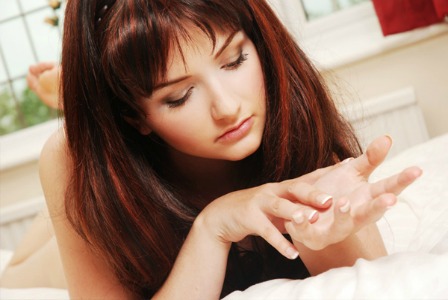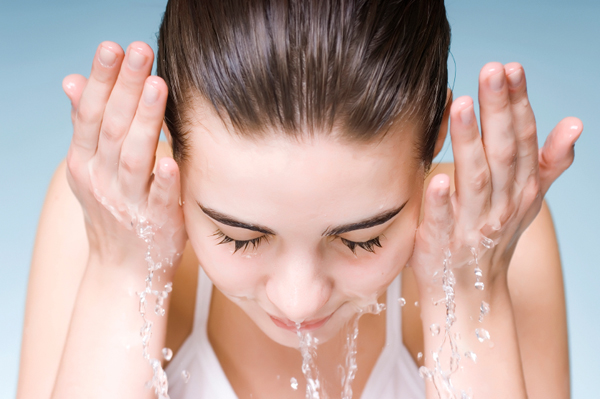
As if teens didn’t have enough to worry about, dealing with chronic skin problems can become not only a daily irritation for them, but a serious emotional issue as well.
Skin care problems other than acne
Experts on skin care and health offer a variety of options to tackle teenage skin problems, from conventional approaches that address symptoms to natural treatments that focus on solving the underlying causes.
Finger warts
These flesh- or dark-colored lumps and bumps are caused by a virus and can grow under fingernails, on fingers, on the backs of hands or even on the soles of feet.
"Warts are very common in teen years, and happen at a time when even a minor imperfection can seem to cause major problems," says Joel Schlessinger, M.D., President Emeritus of the American Society of Cosmetic Dermatology and Aesthetic Surgery.
Tips for treatment: The best way to avoid warts is to avoid biting your nails or injuring your hands. Skin that is injured appears to be more susceptible to the wart viruses. Most warts go away without any treatment within about two years.
There are many treatments, says Schlessinger, such as freezing the growths with liquid nitrogen, burning them off with a laser or a chemical treatment. While the treatments sometimes work, warts can come back.
Eczema/atopic dermatitis
These patches of dry, scaly, reddened skin tend to be more common in young children, but can follow kids into their teen years.
"Many teens involved in sports find their childhood eczema grows worse, frequently aggravated by trauma or by sporting equipment worn on the knees or ankles, for example," says Schlessinger.
Tips for treatment: Sometimes applying a non-perfumed, heavy-duty moisturizer after showering does the trick. This is particularly important after sports and being in cold weather, which can dry and irritate skin. Apply moisturizing lotion immediately after showering, bathing or swimming.
"If a moisturizer doesn't help — or if the skin begins 'weeping,' oozing or becomes significantly red or itchy, it's time to see a dermatologist who can prescribe medications that can help," says Schlessinger.
Natural health practitioners attribute many chronic skin reactions to food or environmental allergens that need to be addressed internally and externally .
Up next: Oily skin
{pageBreak}

Oily complexion
Overactive oil glands can give teens a glistening glow — just not the kind they want.
Tips for treatment: "You can use topical treatments to 'mop up' the oil, or you can get to the root of the problem which is excess oil production, and shut it down — and both methods can work very well," says Charles E. Crutchfield III, M.D., clinical associate professor of dermatology at the University of Minnesota Medical School.
To soak up the oil, suggests Crutchfield, choose products containing alcohol such as a "drying solution" that soaks up excess oil on the surface of the skin. You also may use a blotting product — sheets of specially treated paper that you touch to your face to absorb oil.
Professional laser treatments such as the Aramis laser, for example, are approved by the U.S. Food and Drug Administration for the treatment of oil production in acne. "It actually interacts with the oil glands themselves to get them to be less active. In a sense, it causes them to 'go to sleep' for up to a year, so oil production is dramatically down," says Crutchfield.
The last thing you want to do is to wash your face too much to try to get rid of excess oil. "The 'squeaky clean' feeling people get from using soaps is derived from stripping the fatty oils from our skin, and is more harmful than good," says Resnik. Instead, wash your face with a gentle cleanser no more than twice a day.
Excess sweating
Most nervous teens get sweaty palms and drenched underarms from time to time, but heavy, persistent sweating can be a condition called hyperhidrosis. This condition is characterized by excessive sweating on the palms, soles, underarms, and sometimes, the face. Excessive sweating can be so embarrassing that teens may avoid bringing it up to their parents or doctor.
Tips for treatment: The American Academy of Dermatology suggests these tips to control excess perspiration:
- Wear natural fibers like cotton, which are cooler and absorb sweat.
- Use absorbent inner soles and try to alternate shoes, leaving a day in between so they can dry out.
- Avoid foods and drinks that trigger sweating. These vary from person to person, but may include spicy dishes or very hot liquids such as soups.
- Reduce grains and sugars in the diet that can reduce excessive sweating.
Some physicians recommend maximum-strength antiperspirants that work by plugging the sweat ducts so the perspiration never reaches the skin. In extreme cases, if over-the-counter antiperspirants don't help, a doctor can prescribe medical-strength products.
In extreme cases, doctors occasionally recommend surgical treatment to target sweat glands, as well as Botox, the same substance used as a wrinkle treatment. Small amounts of the purified botulinum A toxin is injected into sweat glands to block the release of a neurotransmitter or brain chemical called acetycholine, which is linked to sweating. The treatment lasts up to eight months and may be repeated. In extreme cases, surgery is performed on the nerve bundles that control sweating.
Teens can also practice stress management, through deep breathing exercises to help reduce the stimulation of the sympathetic nervous system — often the cause of excessive sweating when people feel anxious. In addition, washing underarms with mild soap once or twice a day can reduce bacteria.
Tackling chronic skin care issues can feel overwhelming for a teen who already faces the emotional and physical changes of puberty. Parents and teens can work together to pinpoint and attack the underlying causes of any skin care issue — even the most persistent ones.
More on teen skin care
Helping your teenager deal with acne
Skin care and your teen
Acne and teen self-esteem